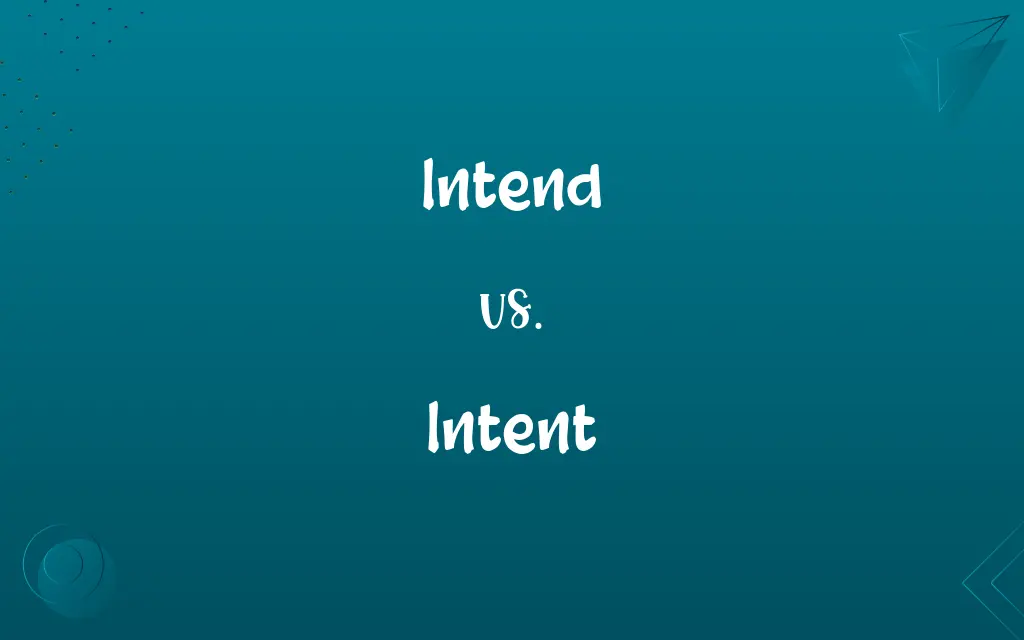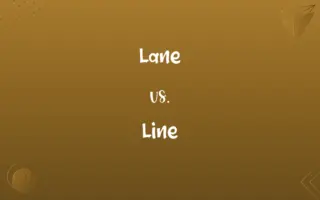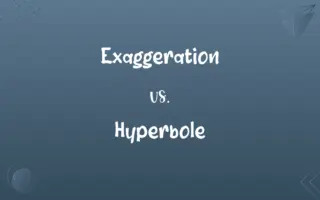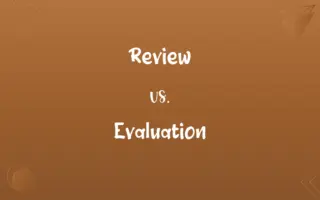Intend vs. Intent: Know the Difference

By Shumaila Saeed || Updated on December 25, 2023
Intend is a verb meaning to have a plan or purpose, while intent is a noun referring to the state of mind with which an action is done or the purpose behind an action.

Key Differences
Intend is a verb, used to describe the action of having a plan or purpose in mind. It indicates the intention of doing something in the future. For example, "I intend to go to the gym tomorrow." This shows a plan or decision made by the speaker. Intent, on the other hand, is a noun. It refers to the purpose or attitude behind an action. It's often used in legal and formal contexts to describe the mindset of a person when they perform an act, like in "The defendant's intent was clear."
Shumaila Saeed
Dec 02, 2023
When talking about intend, it usually requires an object or an infinitive to complete its meaning, such as intending to do something or intending something for a particular purpose. For instance, "She intends to finish her project by Friday." In contrast, intent can stand alone or be followed by a prepositional phrase. It’s often found in phrases like "with the intent of" or "his intent to deceive."
Shumaila Saeed
Dec 02, 2023
Intend is dynamic, indicating an active plan or decision. It’s about what one plans to do, which can change over time. For instance, "They intend to move to a new city next year." Intent is more static, describing a fixed state of mind or purpose at a particular moment. It’s about the reason or motive behind an action, as in "Her intent was to provide help."
Shumaila Saeed
Dec 02, 2023
The usage of intend is more common in everyday language, reflecting personal plans or goals. It’s often used in casual and planning conversations. For example, "I intend to learn Spanish." Intent, however, is more formal and is frequently used in legal, psychological, or deep analytical contexts to describe a deeper level of purpose or reasoning, like "His intent was questioned during the trial."
Shumaila Saeed
Dec 02, 2023
In terms of etymology, both intend and intent originate from the Latin word 'intendere', meaning to stretch out or to aim at. However, over time, intend has evolved to signify the action of planning or aiming for something, while intent has come to denote the purpose or aim itself.
Shumaila Saeed
Dec 02, 2023
ADVERTISEMENT
Comparison Chart
Requirement in Sentence
Needs an object or infinitive
Can stand alone or with preposition
Shumaila Saeed
Dec 02, 2023
ADVERTISEMENT
Intend and Intent Definitions
Intend
To aim or design for a specific purpose.
She intends the new program for young artists.
Shumaila Saeed
Nov 26, 2023
Intent
The design or purpose to use a particular means to achieve an end.
The intent behind the campaign was to raise awareness.
Shumaila Saeed
Nov 26, 2023
Intent
Meaning or significance.
The intent of the law was to protect consumers.
Shumaila Saeed
Nov 26, 2023
Intend
To have a plan or purpose to do something.
I intend to visit Paris next summer.
Shumaila Saeed
Nov 26, 2023
ADVERTISEMENT
Intent
The state of mind with which an act is done.
Her intent in calling the meeting was to increase transparency.
Shumaila Saeed
Nov 26, 2023
Intend
To have in mind as a goal or plan.
He intends to start his own business.
Shumaila Saeed
Nov 26, 2023
Intent
The act of intending or planning.
The project's success was a result of careful intent.
Shumaila Saeed
Nov 26, 2023
Intend
To have in mind; plan
We intend to go. They intend going. I intended that you would go as well.
Shumaila Saeed
Oct 19, 2023
Intend
To have in mind for a particular use
I intended the flowers as a present to her.
Shumaila Saeed
Oct 19, 2023
Intent
Having the attention applied; engrossed
The students, intent upon their books, did not hear me enter the room.
Shumaila Saeed
Oct 19, 2023
Intent
Having the mind and will focused on a specific purpose
Was intent on leaving within the hour.
Are intent upon being recognized.
Shumaila Saeed
Oct 19, 2023
Intend
To fix the mind upon (something, or something to be accomplished); be intent upon
He intends to go to university.
They evidently intended some mischief.
Shumaila Saeed
Oct 19, 2023
Intent
(legal) The state of someone’s mind at the time of committing an offence.
Shumaila Saeed
Oct 19, 2023
Intent
Firmly fixed or concentrated on something.
A mind intent on self-improvement
Shumaila Saeed
Oct 19, 2023
Intent
Closely directed; strictly attentive; bent; - said of the mind, thoughts, etc.; as, a mind intent on self-improvement.
Shumaila Saeed
Oct 19, 2023
Intent
Having the mind closely directed to or bent on an object; sedulous; eager in pursuit of an object; - formerly with to, but now with on; as, intent on business or pleasure.
Be intent and solicitous to take up the meaning of the speaker.
Shumaila Saeed
Oct 19, 2023
Intent
The act of turning the mind toward an object; hence, a design; a purpose; intention; meaning; drift; aim.
Be thy intents wicked or charitable.
The principal intent of Scripture is to deliver the laws of duties supernatural.
Shumaila Saeed
Oct 19, 2023
Intent
An anticipated outcome that is intended or that guides your planned actions;
His intent was to provide a new translation
Good intentions are not enough
It was created with the conscious aim of answering immediate needs
He made no secret of his designs
Shumaila Saeed
Oct 19, 2023
Intend
To stretch; to extend; to distend.
By this the lungs are intended or remitted.
Shumaila Saeed
Oct 19, 2023
Intend
To strain; to make tense.
When a bow is successively intended and remedied.
Shumaila Saeed
Oct 19, 2023
Intent
Wholly absorbed as in thought;
Deep in thought
That engrossed look or rapt delight
The book had her totally engrossed
Enwrapped in dreams
So intent on this fantastic...narrative that she hardly stirred
Rapt with wonder
Wrapped in thought
Shumaila Saeed
Oct 19, 2023
Intend
To apply with energy.
Let him intend his mind, without respite, without rest, in one direction.
Shumaila Saeed
Oct 19, 2023
Intent
Determination to perform a particular act or to act in a particular manner.
With clear intent, he navigated the complex negotiation.
Shumaila Saeed
Nov 26, 2023
Intend
To fix the mind on; to attend to; to take care of; to superintend; to regard.
Having no children, she did, with singular care and tenderness, intend the education of Philip.
My soul, not being able to intend two things at once, abated of its fervency in praying.
Shumaila Saeed
Oct 19, 2023
Intend
To fix the mind upon (something to be accomplished); to be intent upon; to mean; to design; to plan; to purpose; - often followed by an infinitely with to, or a dependent clause with that; as, he intends to go; he intends that she shall remain.
They intended evil against thee.
To-morrow he intendsTo hunt the boar with certain of his friends.
Shumaila Saeed
Oct 19, 2023
Intend
To design mechanically or artistically; to fashion; to mold.
Modesty was madeWhen she was first intended.
Shumaila Saeed
Oct 19, 2023
Intend
To pretend; to counterfeit; to simulate.
Intend a kind of zeal both to the prince and Claudio.
Shumaila Saeed
Oct 19, 2023
Intend
Have in mind as a purpose;
I mean no harm
I only meant to help you
She didn't think to harm me
We thought to return early that night
Shumaila Saeed
Oct 19, 2023
Intend
Mean or intend to express or convey;
You never understand what I mean!
What do his words intend?
Shumaila Saeed
Oct 19, 2023
Intend
Denote or connote;
`maison' means `house' in French
An example sentence would show what this word means
Shumaila Saeed
Oct 19, 2023
Intend
To have a course of action as one's purpose.
They intend to make changes to the policy.
Shumaila Saeed
Nov 26, 2023
Repeatedly Asked Queries
Is "intend" formal or informal?
"Intend" is neutral and used in both formal and informal contexts.
Shumaila Saeed
Dec 02, 2023
Can "intend" indicate future plans?
Yes, "intend" often refers to future actions or plans.
Shumaila Saeed
Dec 02, 2023
Does "intend" imply a commitment?
Yes, it suggests a plan or decision, but not a firm commitment.
Shumaila Saeed
Dec 02, 2023
Is "intent" commonly used in legal contexts?
Yes, "intent" is frequently used in legal and formal settings.
Shumaila Saeed
Dec 02, 2023
Can "intend" be used without an object?
No, "intend" usually requires an object or infinitive.
Shumaila Saeed
Dec 02, 2023
Does "intent" refer to a state of mind?
Yes, it refers to the purpose or mindset behind an action.
Shumaila Saeed
Dec 02, 2023
Can "intent" change over time?
"Intent" describes a state at a specific time and is less likely to change frequently.
Shumaila Saeed
Dec 02, 2023
How does "intent" relate to an action?
"Intent" relates to the reasoning or purpose behind an action.
Shumaila Saeed
Dec 02, 2023
Can "intend" be used in past tense?
Yes, like "intended," it can refer to past plans or purposes.
Shumaila Saeed
Dec 02, 2023
Do "intend" and "intent" have the same origin?
Yes, both come from the Latin "intendere," meaning to stretch out or aim at.
Shumaila Saeed
Dec 02, 2023
Does "intent" imply a deeper level of thought?
Yes, it often suggests a well-thought-out purpose or motive.
Shumaila Saeed
Dec 02, 2023
Can "intent" be used alone in a sentence?
Yes, "intent" can stand alone or be used with a preposition.
Shumaila Saeed
Dec 02, 2023
Is "intent" objective or subjective?
"Intent" is subjective, as it relates to personal purpose or reasoning.
Shumaila Saeed
Dec 02, 2023
Can "intend" be used in a question?
Yes, e.g., "Do you intend to attend the meeting?"
Shumaila Saeed
Dec 02, 2023
Is "intent" always deliberate?
Yes, "intent" implies a deliberate purpose or design.
Shumaila Saeed
Dec 02, 2023
Are "intend" and "intent" interchangeable?
No, they serve different grammatical functions and contexts.
Shumaila Saeed
Dec 02, 2023
Is "intend" related to future or past actions?
"Intend" is primarily related to future actions or plans.
Shumaila Saeed
Dec 02, 2023
Can "intend" suggest a tentative plan?
Yes, "intend" can indicate plans that are not yet final.
Shumaila Saeed
Dec 02, 2023
Share this page
Link for your blog / website
HTML
Link to share via messenger
About Author
Written by
Shumaila SaeedShumaila Saeed, an expert content creator with 6 years of experience, specializes in distilling complex topics into easily digestible comparisons, shining a light on the nuances that both inform and educate readers with clarity and accuracy.






































































